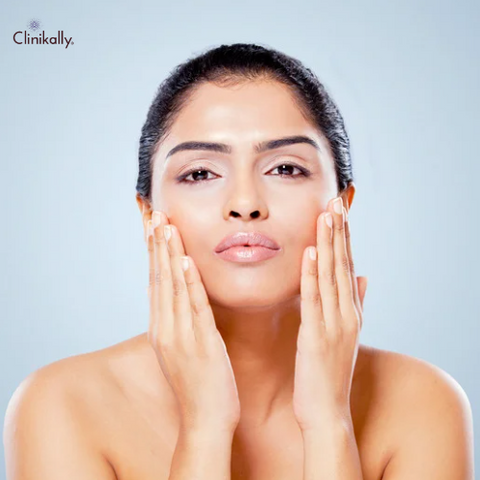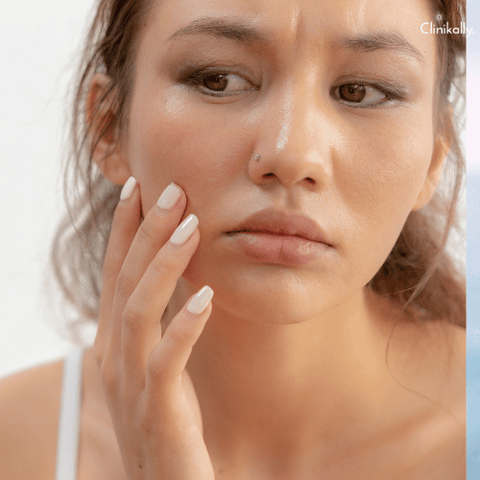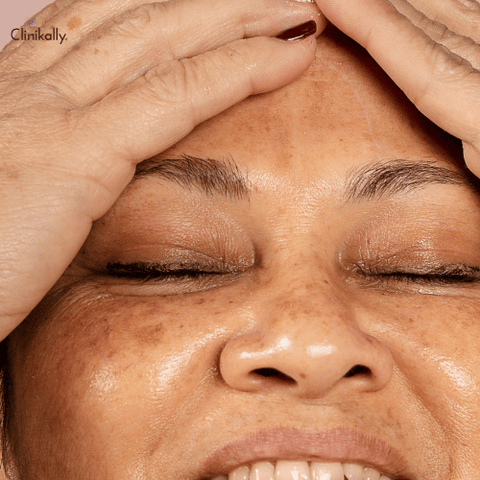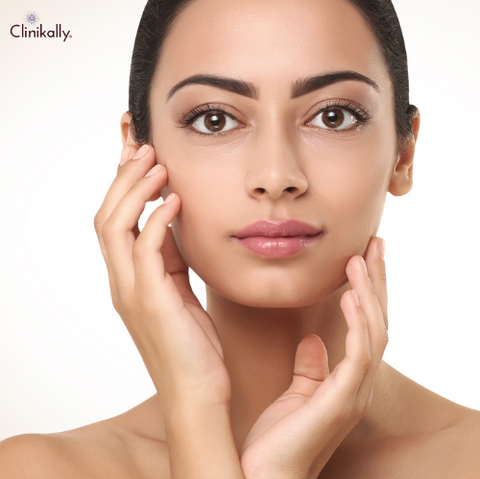Due to its many advantages, jojoba oil, a natural and adaptable product, has become increasingly popular in the skincare sector. Native Americans have used it for millennia for its medicinal and cosmetic benefits. It is made from the seeds of the jojoba shrub, a native of North America. Some of the advantages of jojoba oil for glowing skin include moisturising the skin, reducing inflammation, balancing oil production, protecting against environmental damage, improving skin texture, and being non-comedogenic.
Apply a few drops of jojoba oil to your face and neck after cleansing and toning to incorporate it into your skincare regimen. For a boost in moisture and nourishment, you can combine it with other skincare products like moisturisers, serums, or masks. Jojoba oil is a great product for people who want to have glowing, healthy-looking skin. It is a beneficial addition to any skincare regimen thanks to its moisturising, anti-inflammatory, and protective qualities.
Unveiling the Secret: What is Jojoba Oil?

Simmondsia chinensis, also known as jojoba, is a shrub whose seeds are used to make jojoba oil, a liquid wax. Native to North America, the plant is primarily cultivated in dry areas of the United States, Mexico, and South America. Although jojoba oil is frequently called an oil, it is actually a wax ester that closely resembles the natural oils secreted by our skin. It has great moisturising and emollient characteristics due to the long-chain fatty acids and fatty alcohols that make up its composition.
Jojoba oil is a common ingredient in many skincare and cosmetic products because of its light, non-greasy texture and yellow-to-golden colour. It can assist in moisturising and conditioning the hair without leaving a greasy residue; hence, it is commonly used in hair care products. The fact that jojoba oil is stable and oxidation-resistant, meaning it has a long shelf life and does not soon go rancid, is one of its special qualities. It is a great element for creating natural skincare products without synthetic preservatives because of this. The natural and adaptable ingredient of jojoba oil provides several advantages for the skin, hair, and general health. It is a useful complement to any beauty regimen thanks to its moisturising, emollient, and protecting qualities.
Origin and Extraction of Jojoba Oil
The seeds are cold-pressed to release the liquid wax, which is how jojoba oil is made. The seeds are mechanically pressed to extract the oil after being first roasted to remove the outer shell. The finished oil is then cleaned and filtered to get rid of unwanted contaminants. Jojoba oil's composition of wax esters, which closely mirrors the natural oils secreted by our skin, is one of its special qualities. As a result, it is a great component for skincare products because it can aid in preserving and moisturising the skin without leaving a greasy aftertaste.
Jojoba oil is used in many different industries in addition to its advantages for skin care. It is frequently used as a natural substitute for petroleum-based lubricants and as a lubricant in machinery. Additionally, it is employed in the food business as a cooking oil and as a component of numerous dietary supplements. Jojoba oil is extracted using a straightforward, organic procedure that results in a useful ingredient with a variety of health advantages for the skin, hair, and body.
Jojoba Oil's Unique Chemical Composition
Jojoba oil differs from other plant-based oils due to its distinctive chemical makeup. It is made up of fatty alcohols and long-chain fatty acids, which together form a kind of wax ester with a structure like that of the natural oils secreted by our skin. Jojoba oil has many advantages for the skin as a result of its distinctive composition. It works well as a moisturiser and emollient since it is easily absorbed by the skin and leaves no oily residue behind. It is advantageous for both dry and oily skin types, as it can balance the skin's natural oil production.
Vitamin E, vitamin B-complex, zinc, copper, selenium, and iodine are among the vitamins and minerals that jojoba oil is particularly high in. These minerals assist with general skin health and function while also nourishing and protecting the skin. Jojoba oil has a number of other purposes in addition to its advantages for skin care. It is frequently employed as a natural lubricant for machinery as well as a carrier oil for essential oils and aromatherapy. It is a great ingredient for natural beauty and cosmetic products due to its stability and resistance to oxidation. Because of its distinctive chemical makeup, jojoba oil is a desirable and adaptable ingredient for a range of products, from cosmetics to industrial applications. It is an excellent choice for maintaining healthy, radiant skin due to its ability to mimic the natural oils produced by our skin.
Remarkable Skin Benefits of Jojoba Oil

Due to its many skin benefits, jojoba oil is a flexible and well-liked ingredient in skincare products. The following are some of the outstanding skin advantages of jojoba oil:
-
Skin moisturiser: Jojoba oil is a natural moisturiser that helps to keep the skin hydrated and moisturised. It is easily absorbed by the skin, making it an excellent choice for people with dry skin.
-
Reduces wrinkles and fine lines: Jojoba oil contains antioxidants that aid in the fight against free radicals that cause premature skin ageing. This makes it effective at reducing wrinkles and fine lines.
-
Controls oil production: Because jojoba oil resembles the natural oils produced by the skin, it is an effective oil control agent. It controls oil production and keeps the skin from becoming too oily or dry.
-
Sunburn relief: Jojoba oil contains vitamin E, which helps to reduce inflammation and soothe sunburned skin. It also has a cooling effect that helps to reduce redness and irritation.
-
Reduces acne: Because of its antibacterial properties, jojoba oil is effective at reducing acne. It also aids in the unclogging of pores and the prevention of the build-up of excess oil and dead skin cells.
-
Improves skin texture: Because jojoba oil is non-greasy, it is an excellent moisturiser for all skin types. It also aids in the improvement of skin texture, making it appear smoother and more even.
-
Strengthens nails: Jojoba oil can also be used to strengthen nails and keep them from becoming brittle and weak. It contains essential nutrients that promote healthy nail growth and prevent breakage.
Jojoba oil is a very beneficial component of skin care products and has a variety of uses for enhancing the health and appearance of the skin.
Intense Hydration and Moisture Retention
The maintenance of well-hydrated skin and moisture retention is essential for keeping skin healthy and youthful-looking. The following advice will help you maintain significant hydration and moisture:
-
Drink plenty of water: Keeping your skin hydrated requires plenty of water. To keep your skin hydrated, drink at least eight glasses of water per day.
-
Use a hydrating moisturiser: Select a moisturiser that is intended to hydrate and nourish the skin. Look for ingredients that help to lock in moisture, such as hyaluronic acid, glycerin, and ceramides.
-
Use a humidifier: Humidifiers add moisture to the air, which can aid in the hydration of your skin. Use a humidifier in your bedroom or other rooms where you spend a lot of time at home.
-
Avoid taking hot showers: Hot water can strip the skin of its natural oils, causing dryness and dehydration. Instead, take lukewarm showers and keep your shower time to no more than 10 minutes.
-
Exfoliate on a regular basis: Exfoliating removes dead skin cells, allowing moisturisers to penetrate deeper into the skin. Use a gentle exfoliator no more than once or twice a week.
-
Use a hydrating serum: Serums are concentrated formulas that deliver active ingredients to the skin's surface. To increase hydration, look for a hydrating serum that contains ingredients like hyaluronic acid or vitamin C.
-
Eat a healthy diet: A diet rich in fruits, vegetables, and healthy fats can help to keep your skin hydrated from the inside out. Avoid foods that are high in sugar and processed ingredients, which can dehydrate the skin.
These suggestions can help you retain moisture and attain intense hydration, which will keep your skin smooth, supple, and healthy.
Acne and Blemish Control
There are various methods you can take to control and avoid acne and pimples, even though they can be annoying and challenging to manage. Here are some pointers to assist you in managing your blemishes and acne:
-
Keep your skin clean: Use a gentle cleanser twice a day to remove dirt, oil, and other impurities that can clog pores and cause acne.
-
Choose non-comedogenic skincare and makeup: Non-comedogenic skincare and makeup products will not clog pores.
-
Keep your hands off your face: Using your hands to touch your face can spread bacteria and oil from your hands to your face, causing acne.
-
Utilise topical remedies: By reducing inflammation and clearing clogged pores, topical remedies like benzoyl peroxide, salicylic acid, and retinoids can aid in the management of acne. These items can be purchased over the counter or on a dermatologist's prescription.
-
Watch what you eat: Some studies claim that foods like dairy and those with a high glycaemic index may aggravate acne. Keep an eye on your diet and try to steer clear of anything that might make you break out with acne.
-
Manage your stress: Stress can worsen inflammation and oil production in acne, which can lead to breakouts. Find techniques to control your stress, such as yoga, meditation, or physical activity.
-
Avoid popping pimples: Popping pimples can leave scars and lead to new breakouts. Instead, apply a spot treatment to the pimple to help with drying it out and reducing inflammation.
By using these suggestions, you can improve the health and appearance of your skin overall while controlling acne and blemishes more effectively. It might take some time before you see results, so try to be patient. Consider visiting a dermatologist for additional treatment options if your acne is severe or persistent.
Anti-Inflammatory and Soothing Properties
Anti-inflammatory and soothing properties are important for maintaining healthy and calm skin. Here are some pointers to help you accomplish these qualities:
-
Use gentle skincare products: Pick skincare items that are soothing and won't irritate the skin. Look for products that feature anti-inflammatory and calming natural components like aloe vera, chamomile, or oatmeal.
-
Use cold compresses: To help reduce inflammation and calm irritated or inflamed skin, apply a cold compress. Apply the affected area with a soft cloth or towel that has been soaked in cold water, or wrap a bag of frozen peas in a towel.
-
Use anti-inflammatory ingredients: Seek out skincare products that contain anti-inflammatory elements like niacinamide, green tea, or turmeric. These substances may lessen inflammation and calm the skin.
-
Avoid hot water: Hot water can irritate the skin and remove its natural oils. When cleaning your face, use lukewarm water and stay away from hot showers and baths.
-
Use sunscreen: Sun exposure can cause skin inflammation and irritation. To protect your skin from UV rays, use broad-spectrum sunscreen with an SPF of at least 30.
-
Manage stress: Stress can cause skin inflammation and aggravate pre-existing skin conditions. Find stress-relieving activities such as exercise, meditation, or yoga.
-
Get enough sleep: Sleep deprivation can cause inflammation in the body, leading to skin irritation and inflammation. Aim for 7-8 hours of sleep each night to keep your skin healthy and calm.
You may give your skin anti-inflammatory and calming properties by using the advice in this article, which will assist in maintaining its glowing, peaceful, and healthy appearance. Obtain additional treatment options from a dermatologist if your skin irritation is severe or chronic.
Anti-Aging and Skin Repair
Anti-aging and skin repair are important for maintaining a youthful and healthy complexion. The following advice will assist in obtaining these qualities:
-
Use sunscreen: Sun damage is a major contributor to wrinkles, fine lines, and age spots on the skin. Every day, shield your skin from UV rays by using broad-spectrum sunscreen with an SPF of at least 30.
-
Utilise retinoids: Retinoids are a type of vitamin A that can aid in promoting the production of collagen and minimising the appearance of wrinkles and fine lines. Look for retinoid-containing skin care products, or ask your dermatologist about available prescription options.
-
Remain hydrated: Maintaining skin hydration is crucial for preventing the appearance of fine lines and wrinkles. This can be accomplished by drinking enough water each day. To keep your skin hydrated, try to drink at least eight glasses of water every day.
-
Eat a healthy diet: Eating a diet high in fruits, vegetables, and healthy fats can aid in skin hydration and repair. Avoid foods that are high in sugar and processed ingredients because they can speed up the ageing process of your skin.
-
Use antioxidants: Antioxidants can help to protect the skin from free radical damage and support skin repair. Examples of such antioxidants include vitamins C and E. Look for skincare products with antioxidants or think about consuming supplements.
-
Use a moisturiser: Moisturising the skin can help to keep it hydrated, which can make wrinkles and fine lines less noticeable. Select a moisturiser with anti-aging ingredients like hyaluronic acid or peptides that is specially formulated for your skin type.
-
Get enough sleep: Lack of sleep can speed up the ageing process of the skin by reducing collagen production and escalating inflammation. To maintain healthy, youthful skin, try to get at least 7-8 hours of sleep every night.
These suggestions will help you maintain the youthful and healthy appearance of your skin while providing anti-aging and skin repair benefits. Keep in mind that it might take some time before you see results. If you're interested in additional treatment options for ageing signs that are severe or persistent, talk to a dermatologist.
Incorporating Jojoba Oil into Your Skincare Regimen

Given that it provides a number of skin benefits, jojoba oil might be an advantageous addition to your skincare routine. To incorporate jojoba oil into your skincare routine, follow these suggestions:
-
Cleaning: Jojoba oil can be used to gently cleanse the skin of dirt, makeup, and impurities. Simply apply a small amount of jojoba oil to your face and massage it for a minute or two before rinsing with warm water.
-
Moisturising: Jojoba oil is a non-greasy, lightweight moisturiser that can help hydrate and nourish the skin. After cleansing, apply a few drops of jojoba oil to your face and gently massage it in. You can add a few drops of jojoba oil to your regular moisturiser for extra hydration.
-
Exfoliating: Jojoba oil can be used as a gentle exfoliant to remove dead skin cells and promote cell turnover. To make a natural scrub, combine a small amount of jojoba oil with sugar or sea salt, then gently massage it into your skin in circular motions.
-
Acne treatment: Jojoba oil has anti-inflammatory and antibacterial properties that can help to lessen inflammation and stop acne breakouts. You can use jojoba oil as a spot treatment on your face or combine it with other acne-busting ingredients like tea tree oil or aloe vera.
-
Soothing Irritation: Jojoba oil has anti-inflammatory and soothing properties that can help to soothe irritated or inflamed skin. Apply a small amount of jojoba oil to the affected area and gently massage it in to help reduce inflammation and redness.
-
Makeup Removal: Jojoba oil can be used as a natural makeup remover. Apply a small amount of jojoba oil to a cotton pad or cloth and use it to gently remove your makeup.
Before using jojoba oil on your full face, remember to conduct a patch test because some people may be sensitive or allergic to it. To guarantee that you are receiving the entire range of skin benefits, be sure to select a pure, high-quality jojoba oil.
Choosing High-Quality Jojoba Oil
To guarantee you are receiving all the benefits of jojoba oil for skincare, it is crucial to choose a high-quality, pure product. When choosing jojoba oil, keep the following things in mind:
-
Look for pure jojoba oil: Some "jojoba oil" products may contain other oils or synthetic ingredients. To ensure that you are getting the full range of benefits, look for a product that is 100% pure jojoba oil.
-
Check the source: The seeds of the jojoba plant are used to make jojoba oil. Choose a product made with jojoba seeds that were farmed sustainably and with consideration for the environment. A suitable alternative is organic jojoba oil, which is free of pesticides and other dangerous substances.
-
Consider the extraction method: There are several ways to extract jojoba oil, including cold pressing and chemical extraction. Jojoba oil that has been cold-pressed is often thought to be of the best quality because the oil's beneficial characteristics have been preserved during the natural process of extraction.
-
Check the colour and scent: High-quality jojoba oil should be clear or pale yellow in colour, with a mild, nutty scent. If the oil has a strong odour or is dark in colour, it is likely of lower quality.
-
Examine the following reviews: To determine the efficacy and quality of jojoba oil before buying it, read user reviews and ratings.
You can make sure that you are receiving the entire range of skin benefits, such as hydration, anti-aging effects, and acne management, by picking a high-quality jojoba oil. To protect the therapeutic benefits of your jojoba oil, keep it in a cool, dark place.
How to Use Jojoba Oil for Different Skin Types
A flexible skincare product that works on different skin types is jojoba oil. Following are some pointers for utilising jojoba oil for various skin types:
-
Dry skin: Jojoba oil helps to hydrate and nourish the skin without leaving a greasy aftertaste, making it an ideal moisturiser for dry skin. After cleaning your face, gently massage in a few drops of jojoba oil.
-
Oily skin: Contrary to popular belief, jojoba oil can really assist oily skin types to manage their oil production. After cleaning your face, gently massage in a few drops of jojoba oil. A breakout can be avoided by using jojoba oil to control sebum production.
-
Combination skin: Jojoba oil can be used to moisturise dry areas and regulate oil production in oily areas on combination skin. After cleansing your face, gently massage a few drops of jojoba oil into any dry or oily areas of your face.
-
Sensitive skin: Jojoba oil is a good option for sensitive skin because it is soothing and non-irritating. After cleansing your face, apply a small amount of jojoba oil and gently massage it into your skin.
-
Acne-prone skin: Jojoba oil contains anti-inflammatory and antibacterial properties that can aid in the reduction of inflammation and the prevention of acne breakouts. Apply jojoba oil to your face as a spot treatment or combine it with other acne-fighting ingredients like tea tree oil or aloe vera.
Remember to patch test jojoba oil before using it on your entire face, as it may cause allergic reactions or sensitivity in some people. Also, keep in mind that everyone's skin is different, so it may take some trial and error to find the best way to incorporate jojoba oil into your skincare routine.
Tips and Tricks for Maximising Jojoba Oil Benefits
The following hints will help you use jojoba oil to its full potential in your skincare regimen:
-
Use it to remove makeup: Jojoba oil is a fantastic natural makeup remover that can assist in dissolving and removing even the most tenacious makeup. Simply apply a small amount of jojoba oil to a cotton pad and gently swipe over your face to remove makeup.
-
Combine it with other skincare ingredients: Jojoba oil can be combined with other organic ingredients like tea tree oil, honey, or aloe vera to create a unique skincare regimen. For example, combining jojoba oil with honey can help to hydrate and soothe dry skin, while combining it with tea tree oil can help to fight acne.
-
Use it as a body moisturiser: Jojoba oil has uses other than on your face. It can also be applied to your body as a moisturiser, particularly to dry regions like your feet, elbows, and knees. After taking a shower, massage a little quantity of jojoba oil onto damp skin to help retain moisture.
-
Apply it to damp skin: Apply jojoba oil to damp skin for the best results. This can help to retain moisture and improve absorption.
-
Use it as a hair treatment: Jojoba oil is also good for hair because it can hydrate and nourish dry, damaged hair. Apply a few drops of jojoba oil to the ends of your hair before styling, or use it as a leave-in treatment overnight for extra hydration.
Always perform a patch test before applying jojoba oil to your entire face or body, especially if you have sensitive skin. Consistency is essential to reaping the long-term advantages of jojoba oil, just like it is with any other skincare product.
Jojoba Oil: Beyond the Face

Jojoba oil has a number of advantages for the whole body, not just the face. Here are some other uses for jojoba oil other than on the face:
-
Lip balm: Jojoba oil can be used to moisturise and soothe dry, chapped lips. Apply a small amount of jojoba oil to your lips before bed or as needed throughout the day.
-
Cuticle oil: Jojoba oil can help to nourish and strengthen cuticles. Apply a small amount of jojoba oil to your cuticles and massage it gently.
-
Moisturiser for hands and feet: Jojoba oil can hydrate and soften dry, chapped skin on the hands and feet. After taking a shower or right before bed, apply a small amount of jojoba oil to damp skin.
-
Body oil: Jojoba oil is a natural substitute for branded body oils. After taking a shower, massage some jojoba oil onto your damp skin for hydrated, soft skin.
-
Natural massage oil: Jojoba oil works well as a massage oil because it helps products glide over the skin without leaving a greasy film. A few drops of jojoba oil combined with your preferred essential oils will make for a soothing and nourishing massage.
Always perform a patch test on a small area of skin before applying jojoba oil, especially if you have sensitive skin. Consistency is essential to reaping the long-term benefits of jojoba oil, just like it is with any other skincare ingredient.
Hair and Scalp Benefits
The health of the hair and scalp can also benefit from jojoba oil. The following are some advantages for your hair:
-
Moisturizes hair: Jojoba oil is a great natural hair moisturiser. It can assist in moisturising dry, brittle hair and lowering breakage.
-
Improves hair texture: Using jojoba oil on a regular basis can help to improve hair texture, making it softer and more manageable.
-
Reduces dandruff: Jojoba oil contains anti-fungal properties that can aid in the reduction of dandruff and the promotion of a healthy scalp.
-
Protects hair: Jojoba oil can help to protect hair from damage caused by heat styling and environmental factors like pollution.
-
Adds shine: Jojoba oil can aid in giving hair that is lifeless and dull some shine.
Apply a tiny amount of jojoba oil to your scalp and hair, paying special attention to the ends, to utilise it on your hair. As a hair treatment, you may either leave it on overnight or wash it off after 30 to 60 minutes. To increase hydration and shine, mix a few drops of jojoba oil into your shampoo or conditioner. Before using jojoba oil over your entire head of hair, it's crucial to patch-test it on a tiny portion of your scalp, as you should with any new product.
Nail and Cuticle Care
Jojoba oil is excellent for caring for cuticles and nails. The following are a few ways it can help your nails:
-
Strengthens nails: Jojoba oil can help to strengthen brittle nails and keep them from breaking or splitting.
-
Softens cuticles: Using jojoba oil on a regular basis can help to soften cuticles, making it easier to push them back and preventing hangnails.
-
Moisturises nails: Jojoba oil can help to moisturise and hydrate nails, preventing them from becoming dry and brittle.
-
Promotes healthy nail growth: Vitamin E and other nutrients found in jojoba oil may help to encourage healthy nail development.
Apply a tiny amount of jojoba oil to your cuticles and nails and gently massage it in. For additional hydration and nourishment, mix a few drops of jojoba oil into your preferred hand cream. Before using jojoba oil all over your nails and cuticles, it's crucial to patch-test it on a tiny area of your skin, as you should with any new product.
Body Moisturizer and Massage Oil
Jojoba oil has nourishing and hydrating qualities that make it suitable for use as a massage oil and body moisturiser. Here is how to apply it:
-
Body moisturiser: After getting out of the shower, gently massage a few drops of jojoba oil into damp skin. Your skin will feel smooth and soft after doing this, which will aid in retaining moisture.
-
Massage oil: Jojoba oil can be used as a massage oil as well. Use jojoba oil with a few drops of your favourite essential oil to massage sore muscles or to promote relaxation.
-
Foot massage oil: Jojoba oil is especially useful for foot massages. It can help to soften rough, dry skin and soothe tired feet.
-
Dry skin treatment: Apply jojoba oil to the affected area to help hydrate and soothe it if you have particularly dry or flaky skin.
Before using jojoba oil all over your body, as with any new product, patch-test it on a small area of the skin.
Final Thoughts on Embracing Jojoba Oil for Skin Health

In conclusion, jojoba oil is a flexible and natural substance that can assist your skin, hair, nails, and even your general health. It is a fantastic option for all skin types because of its distinctive composition, which closely mirrors the natural oils produced by our skin. You may take advantage of jojoba oil's moisturising, anti-inflammatory, and anti-aging effects, among others, by including it in your regular skincare routine. Jojoba oil helps keep your skin looking healthy and attractive, whether you use it as a face oil, body moisturiser, or hair treatment. Make sure to get high-quality, cold-pressed jojoba oil that is devoid of any additives or artificial smells. And keep in mind that you should patch-test jojoba oil on a tiny portion of your skin, just like you would with any new product, before applying it all over your body. Incorporating jojoba oil into your skincare regimen can be a straightforward yet effective approach to enhancing the health and appearance of your skin while simultaneously treating yourself to a delightful and soothing self-care ritual.
































